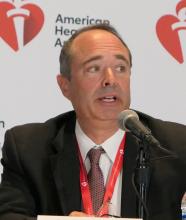The reaction
ISCHEMIA addressed a key clinical issue that’s long been surrounded by equipoise because of a paucity of high-quality data. As such, it was deemed worthy of its own AHA Late-Breaking Science session. The assembled discussants agreed the results will change their clinical practice.
“Based on the trial results to date in the patient population studied in the trial, I as a clinician would feel comfortable advising my patients not to undergo the invasive strategy if their angina was absent or controlled or tolerated. I don’t think we should feel obligated to take them to the cath lab,” said Alice K. Jacobs, MD, an AHA past-president and professor of medicine and director of the cardiac catheterization laboratory and interventional cardiology at Boston Medical Center.
The ISCHEMIA trial has been the target of criticism because of its cost, prolonged duration, and shifting endpoints, but Glenn L. Levine, MD, praised the ISCHEMIA investigators for achieving “as well-designed and -executed a trial as one could practically do in the real world.” ISCHEMIA will undoubtedly be incorporated into AHA/American College of Cardiology guidelines on chest pain and on revascularization that are now in the process of being updated, predicted the cardiologist, who has chaired writing panels for numerous AHA/ACC guidelines.
“As someone who has been intimately involved with our national guidelines for the last 6 years, I say thank you to all the investigators and participants,” added Dr. Levine, professor of medicine at Baylor College of Medicine and director of the cardiac care unit at the Michael E. Debakey Medical Center, Houston.
“I’ll just say that this definitely will change my practice,” commented Brahmajee K. Nallamothu, MD, an interventional cardiologist and professor of medicine at the University of Michigan, Ann Arbor. “Just like the COURAGE trial taught me that not every blockage needs to have a stent in it right away, I think this is teaching me that not every patient with moderate-to-severe ischemia needs to go right away to the cath lab.”
Session cochair James de Lemos, MD, declared, “My take home is this is a remarkable finding. It’s medical proof that revascularization does not appear to have a marked effect.”
“I think the downstream implications of ISCHEMIA with regard to noninvasive testing are massive. I think that’s where will see more of an impact in our practice,” according to Dr. de Lemos, professor of medicine at the University of Texas Southwestern Medical Center and chief of the cardiology service at Parklawn Hospital in Dallas.
Numerous panelists expressed hope that the National Institutes of Health will fund a long-term extension of ISCHEMIA to learn if the results hold up.
The ISCHEMIA trial was funded by the National Heart, Lung, and Blood Institute. Dr. Spertus holds the copyright for the Seattle Angina Questionnaire.
SOURCE: Hochman JS. AHA late breaker.


